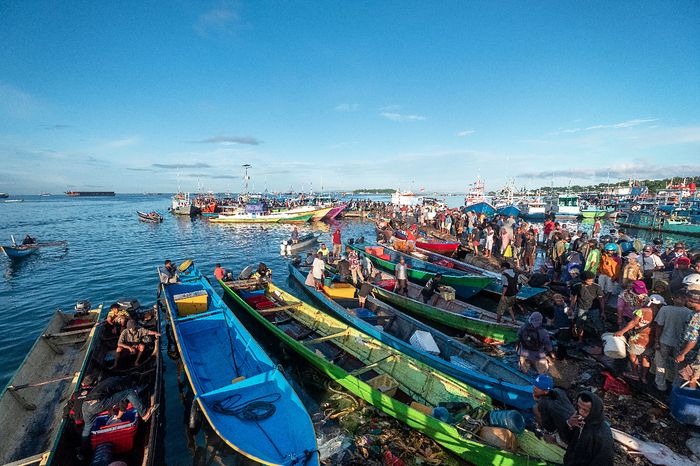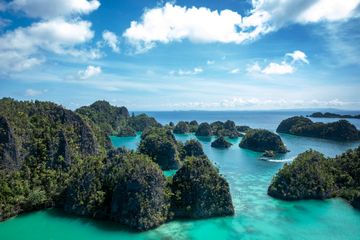From my observation, some challenges remain in Rajaampat: there weren’t as many tourists, species were threatened with extinction, coral bleaching, and plastic pollution to name a few.
Tourism was dying, and it was especially tough for owners of dive centers or small homestays. Throughout the pandemic, only 15 visitors came to the Arborek Dive Shop owned by Githa Anathasia and Marsel Mambrasar. The Covid-19 relief donation were not accurately targeted either.
“We are disappointed with the relief package meant for dive centers and homestays, because to this day we still haven’t received it. We’re just a little upset. How come people who don’t work as a dive guide or at dive centers were prioritized? Meanwhile small business owners like ourselves didn’t receive the donation,” said Marsel, also a dive master.
There was no income from tourism. In the rare occasion that tourists were visiting, they prefer staying at the resorts, which were more luxurious. “Our target market before and during the pandemic has changed so much. It’s so different. People would rather stay at a proper resort than with the local community, although that’s not always the case. Currently, very few foreign guests are visiting, other than those already living in Indonesia,” Githa said.
Although the pandemic caused a drastic drop in tourist visits, it also gave Marsel and Githa an opportunity to rethink what sustainable tourism truly means. They discovered other sources of income, such as gardening and making cured fish. “That’s what we need to understand about sustainable tourism, even when there are no tourists,” Githa told me.

The pandemic gravely affected Rajaampat tourism. The economic relief packages should have reached and helped the coastal community. Restoration activities, coastal cleanup and improvement of village infrastructure could create jobs while improving their economic resilience.
I met with Awaludin Noer Ahmad a.k.a Wawan Mangile. He worked in the Yayasan Konservasi Nusantara as a program coordinator for the Bird’s Head region in Papua. When the pandemic first broke, he said the city’s entire economic activity stalled. But there are many ways to survive in Rajaampat.
“The community is aware of the pandemic, but they’re not worried about food. That’s because we believe that conservation is the way. If tourism is dead completely, we will be miserable. But the villagers in Rajaampat said, oh we still have fish, sago, and kasbi. It’s only money we didn’t have. Tours are merely a bonus from conservation,” he said.
Wawan told me about the history of conservation in Rajaampat before it was established in 2014. In 2001, a survey on Rajaampat was conducted as part of the Coral Triangle Initiative, aimed at supporting the richest marine biodiversity in the world.
Marine Rapid Assessment was carried out by Conservation International, Cendrawasih University, University of Papua, Research and Development Center for Oceanology, The Indonesian Institute of Sciences, Australian Institute of Marine Science, and Western Autralian Museum. The survey recommended that Rajaampat should be protected, and its utilization regulated.
However, according to him, conservation has long been embedded in the local wisdom. But the results were not optimal because it wasn’t combined with science. It would be best if the community turn to science as a manual for conservation.
“For instance, during sasi, they would only take sea cucumbers of a certain size. They wouldn’t just take everything. It would be 5-6 years until another sasi [if they took it all],” Wawan said. “When restricted, they can harvest every year. They don’t catch lobsters that have eggs either. This way we can preserve the lives of sea cucumbers and lobsters.”
Sasi, the local wisdom of Rajaampat, ensures the sustainability of natural resources. Particularly in the sea, biota should not be captured during a certain period of time, before being harvested simultaneously. This tradition ensures that biota can reproduce and not go extinct.
This wisdom can be replicated in other regions of the archipelago. The government may grant harvest rights to coastal communities, or to enterprises, under certain terms and limits. This rights-based principle can encourage better management, and increase fishery productivity. Marsel used to catch sharks before Rajaampat was designated as a conservation area. “I know now,” he said, “if we don’t catch sharks, turtles, manta rays, the foreigners will be happy. They would even stay in Rajaampat for one to two months at a time.”

